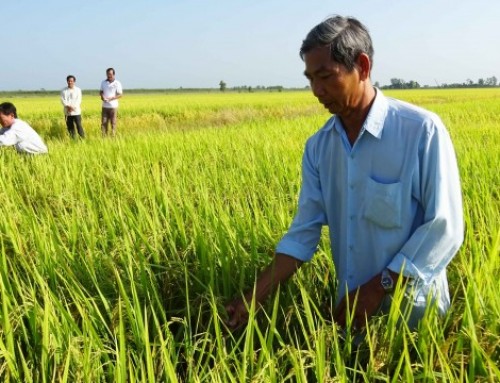Steps to inclusive sustainable agriculture in ASEAN through a value chain seminar

A ValueLinks seminar with participants from six countries in ASEAN took place recently in Siem Reap, Cambodia. Developed by GIZ as an action-oriented approach promoting economic development with a value chain perspective, ValueLinks provides essential know-how on ways to increase employment and income of small-and medium-sized enterprises, and smallholder farmers by promoting the value chains they are operating in.

Mr. Alfons Eiligmann (right) from IDC Unternehmensberatung, Germany, and Claudius Bredehöft, National Project Coordinator, ASEAN SAS Cambodia
The seminar was attended by 29 participants from Cambodia, Indonesia, Lao PDR, Myanmar, Philippines, and Thailand between 25 and 29 April 2016 and facilitated by Mr. Alfons Eiligmann from IDC Unternehmensberatung from Germany, and Claudius Bredehöft, National Project Coordinator of ASEAN Sustainable Agriifood Systems (ASEAN SAS) Cambodia.
“A clear market demand and value proposition for customers is the key drivers of inclusive sustainable agriculture development strategy. A multi-stakeholder partnership and leadership within the supply chain are needed to overcome challenges to link smallholders to markets and to integrate them into value chain, through promoted and upgraded value and risks more equitable and fairly along the value chain,” Mr. Eiligmann from IDC said.

Mr. Giri Arnawa (second from the right), National Project Coordinator of ASEAN SAS Indonesia, a co-facilitator, shared his experiences in the cross broader value chain of biocontrol agents between Cambodia and Indonesia.
The seminar gave a comprehensive introduction of 12 ValueLinks modules consisting of the project design, methods for value chain analysis and strategy formulation, solutions for upgrading in different fields, and tools for facilitation and monitoring.
The five-day training was conducted through a mix of presentations and group work sessions. Participants learned to combine the business logic with the development logic; and value chain development with process facilitation; look for opportunities when starting their businesses, not for problems; and link value chain development with regional economic development and other approaches. Four working groups were assigned to work on examples of value chain promotion in fresh vegetables, cashew nuts, coffee, and bamboo furniture.

Dr. Nittana Southiseng from GIZ Laos
Participant from GIZ Laos, Dr. Nittana Southiseng said she directly gained benefits of the Valuelinks model through the group work on the development of Lao Specialty Coffee Value Chains. This project used for discussion is currently established in Laos under GIZ partnership with private companies and Government of Lao.
The expectation of the seminar were for the project staff and key partners from different organisations to be familiarized with the value chain promotion approach and get a better understanding of instruments and tools used in promoting the value chain.

Ms. Thlang Sovann Pisey, Director of Khmer Organic Cooperative
Director of Khmer Organic Cooperative, Ms. Thlang Sovann Pisey, who attended the training said: “ValueLinks introduces a very interesting tool to be used to develop and link production to the market.”
A particular advantage was that the participants from the GIZ’s Improvement of Livelihood and Food Security (ILF) Programme in Cambodia and ASEAN SAS Partners including the Eco-Agri Center (EAC) and the Khmer Organic Cooperative (KOC) could establish a starting step of creating cooperation for organic vegetable deliveries from the cooperatives to the shops in Phnom Penh.
Mr. Giri Arnawa, National Project Coordinator of ASEAN SAS Indonesia, a co-facilitator, shared his experiences in the cross broader value chain of biocontrol agents between Cambodia and Indonesia in supporting the development of sustainable agrifood systems on the three pillars of sustainability value chains: planet (environmentally), people (socially), and profit (economically).
The participants also took a field visit to GRET Project in Siem Reap Province that initiated vegetables project for communities’ better livelihood. Field findings during the field visit were used to develop existing groups work to practice formulating vision, and overcoming constraints of interventions.
By Giri Arnawa and Claudius Bredehöft, ASEAN Sustainable Agriifood Systems






